|
|
|
Sort Order |
|
|
|
Items / Page
|
|
|
|
|
|
|
| Srl | Item |
| 1 |
ID:
180190
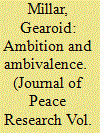

|
|
|
|
|
| Summary/Abstract |
For 50 years positive peace has served as an aspirational goal for many scholars and practitioners of peace. However, much recent scholarly literature evidences a substantial ambivalence toward this ambition, suggesting that prominent theories, policies and practices in the field have failed to support positive peace. This article argues that a key reason for this shortcoming is the field’s failure to respond adequately to the evolving character of conflict (latent and overt) related to technological, legal and economic changes associated with the consolidation of globalization over this period. This consolidation has served to shrink the distances between previously remote actors, to expand exponentially the influence of many institutions, norms, practices and projects as they penetrate new societies, to concentrate power into the hands of ever fewer actors, and to reify instead of deconstruct endemic inequality and marginalization within states, between states, and across the globe. The failure of the field to respond robustly to these changes also prompts concerns about its ability to face sweeping challenges soon to come related to technological innovation, climate change, demographic shifts, labour automation and the search for new governance models. This article, therefore, reaffirms the aspirational goals of peace and conflict studies by building on Lederach’s earlier Peacebuilding Triangle to propose a Trans-Scalar Peace System which would recognize the need for coherent and supplementary policies and actions across scales (global, regional, international, nation and local) and utilize a backward-mapping approach to promote a parity of esteem for actors, institutions and decisions at each scale which would, at the same time, privilege the voice of those with the most pertinent knowledge, experience and capacity for action in support of any given policy or practice. Such an approach would honour the lessons of the ‘local turn’ while developing a global trans-scalar peace system.
|
|
|
|
|
|
|
|
|
|
|
|
|
|
|
|
| 2 |
ID:
159968
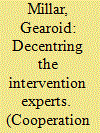

|
|
|
|
|
| Summary/Abstract |
The failures of peace interventions are often associated with their exogenously conceived and technocratic nature, which discount complexity within and diversity between post-conflict contexts. In response, scholars have resorted to concepts of empowerment, resistance, hybridity and friction to refocus post-conflict policymaking away from ‘top-down’ and towards ‘bottom-up’ processes. Any such efforts, however, require that policymakers understand the local drivers and everyday experiences of peace interventions across a range of cases, a task for which the current tools of the intervention experts have proven unsuited. This article, therefore, proposes an Ethnographic Peace Research (EPR) agenda that would provide access for and influence to the ‘peace kept’ and decentre the intervention experts in peacebuilding policy. In its effort to influence policy, however, an EPR agenda faces substantial challenges. These include, among others, the failure of academics to communicate clearly to non-academic audiences, the ideological biases of policymakers and the relentless simplification of complexity. However, as will be discussed and evidenced using a variety of cases below, an EPR approach also has a number of strengths that can enhance its relevance for policy, serve to decentre the intervention experts and develop a credible alternative bottom-up approach to policymaking in post-conflict states.
|
|
|
|
|
|
|
|
|
|
|
|
|
|
|
|
| 3 |
ID:
133706
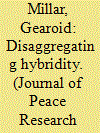

|
|
|
|
|
| Publication |
2014.
|
| Summary/Abstract |
The term 'hybrid' has been widely incorporated into recent peacebuilding scholarship to describe an array of peacebuilding endeavors, including hybrid peacekeeping missions, hybrid criminal tribunals, hybrid governance, and the hybrid peace. However, while widely deployed, hybridity itself is under-theorized and variably applied by scholars. Major concerns arise, therefore, concerning the concept's usefulness for peacebuilding theory, policy, and practice. Most problematically, while some scholars use hybridity descriptively to illustrate the mixing of international and local institutions, practices, rituals, and concepts, many today deploy hybridity prescriptively, implying that international actors can plan and administer hybridity to foster predictable social experiences in complex post-conflict states. This latter literature, therefore, assumes predictable relationships between the administration of hybrid institutions - of law, of governance, or of economics, for example - and the provision of peace-promoting local experiences of those institutions - experiences of justice, authority, empowerment, etc. This article argues that these assumptions are flawed and illustrates how a disaggregated theory of hybridity can avoid such errors. This theory distinguishes between four levels of hybridity - institutional, practical, ritual, and conceptual - characterized by their variable amenability to purposeful administration. The article illustrates how prescriptive approaches that assume direct and predictable relationships between institutions and experiences fail to recognize that concepts underpin local understandings and experiences of the world and, therefore, play a mediating role between institutions and experiences. Using examples from Sierra Leone, the article shows that while concepts are always hybrid, conceptual hybridity is inherently resistant to planned administration. As a result, internationally planned and administered hybrid institutions will not result in predictable experiences and may even result in negative or conflict-promoting experiences. The article illustrates the dangers of assuming any predictable relationships between the four levels of hybridity, and, therefore, between the administration of institutional hybrids and the predictable provision of positive local experiences.
|
|
|
|
|
|
|
|
|
|
|
|
|
|
|
|
| 4 |
ID:
161135
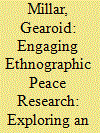

|
|
|
|
|
| Summary/Abstract |
As has been thoroughly rehearsed in the literature, the failures of the liberal peace model of post-conflict intervention have given rise to a ‘local turn’ in peace research. This in turn has refocused attention away from the motivations and practices of international actors towards local ownership and ‘buy-in’, and the importance of culture, context, and ‘the Everyday’. There is a mismatch, however, between the methodological skills among peace researchers today, and the new imperative to explore local and everyday understandings, perceptions, and experiences of conflict, transition, and peace. For this reason a number of scholars have recently emphasized the importance of incorporating ethnographic methods and an anthropological imagination into peace research. However, at this point, and as evidenced in the contributions to this special issue, there are many challenges to such incorporation which must be acknowledge and addressed if the ethnographic approach is to fulfil its early promise to add empirical substance to the local turn. The contributing authors each address different challenges to conducting Ethnographic Peace Research (EPR) in post-conflict contexts and, as this introduction argues, they evidence clearly the variety of questions yet to be answered while suggesting different ways ethnographic approaches can be incorporated into peace research.
|
|
|
|
|
|
|
|
|
|
|
|
|
|
|
|
| 5 |
ID:
161138
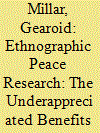

|
|
|
|
|
| Summary/Abstract |
While Peace Studies has always incorporated different research methodologies, large-N quantitative methods and state-level findings have dominated the literature and had most influence on policy and practice. Today, however, the limitations of peace interventions are commonly identified with the institutional, state-centric, and technocratic approaches associated with such limited understandings and their resultant policies. This paper argues, therefore, that the inability of these methods to examine local experiences of conflict, transition, and peace in diverse sociocultural settings contributes to inadequate policy formation and, thus, to problematic interventions. Indeed, the recent ‘local turn’ and its focus on the everyday, resistance, hybridity, and friction demands research that can better interpret local experiences of conflict, transition, and peace and, thereby, discover more locally salient practice. While this paper argues that an Ethnographic Peace Research (EPR) agenda must be central to such efforts, it also argues against applying the ethnographic label to work that is more suitably described as qualitative (site visits, interviews, focus groups, etc.). The paper argues that long-term fieldwork and close engagement with the subjects of peacebuilding must be required within any EPR agenda. The underappreciated benefits of such fieldwork are illustrated with examples from research in northern Sierra Leone.
|
|
|
|
|
|
|
|
|
|
|
|
|
|
|
|
| 6 |
ID:
123994
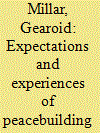

|
|
|
|
|
| Publication |
2013.
|
| Summary/Abstract |
This article investigates local experiences of the Truth and Reconciliation Commission for Sierra Leone and explains how these experiences were influenced by the parallel administration of many peacebuilding processes. Using qualitative data it shows how the goals and procedures of these various processes overlapped and interacted in the imaginations of local people, generated unpredicted expectations, and eventually led to negative experiences of the Commission's work. I describe how Tsing's idea of 'friction' can helpfully explain local experiences of peacebuilding and the new concept of 'compound friction' is introduced as a tool for understanding the local impacts of parallel peacebuilding processes.
|
|
|
|
|
|
|
|
|
|
|
|
|
|
|
|
| 7 |
ID:
154730
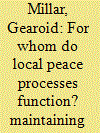

|
|
|
|
|
| Summary/Abstract |
Recent peacebuilding literature provides a sustained critique of externally designed conflict management processes and promotes instead local mechanisms. Such mechanisms, it is argued, will provide more ownership and agency to local actors and, thus, a more sustainable peace. But while there are many examples of local conflict management institutions, and many discussions of the hybrid outcomes of interaction between the global and local, the literature rarely explores exactly what transpires on the ground when international actors influence the operation of local peace processes; this article provides exactly this insight. The data presented illustrate how local conflict management institutions in rural Sierra Leone are subtly manipulated by actors – both international and local – to maintain and enhance existing relations of power. The article illustrates, therefore, the problems that arise when local conflict management institutions become interlaced with new forms of power and start themselves to serve as sites of contestation and resistance.
|
|
|
|
|
|
|
|
|
|
|
|
|
|
|
|
| 8 |
ID:
141139
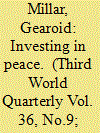

|
|
|
|
|
| Summary/Abstract |
In peace-building and transitional justice literature economic restoration is considered central to sustainable peace in post-conflict societies. However, it is also widely recognised that many post-conflict states cannot afford mechanisms to provide restoration. Not only are many such states poor to begin with, but violent conflict further degrades their economic capacity. As a result, in their need to provide jobs, generate tax revenues, spur development and promote sustainable peace, many post-conflict states turn to alternative processes of economic restoration. This paper examines the potential for foreign direct investment (FDI) to serve as one alternative means by which to provide economic restoration in post-conflict states. Presenting findings from six months of fieldwork evaluating one such project in rural Sierra Leone, the paper describes how local people experience such projects and explores whether employment and land-lease payments can provide experiences of economic restoration so far unforthcoming from the state.
|
|
|
|
|
|
|
|
|
|
|
|
|
|
|
|
| 9 |
ID:
146927
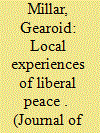

|
|
|
|
|
| Summary/Abstract |
Over the past 20 years scholars have repeatedly highlighted the complex relationship between conflict, peace and economics. It is today accepted that economic factors at the global, regional, national and local levels can promote conflict in various ways and that economic factors are therefore central in establishing a sustainable post-conflict peace. However, while the scholarly literature includes much nuance regarding the precise nature of these complex relationships, practices of peacebuilding are often far less nuanced. Instead there is a tendency to pin the hopes of fragile post-conflict states on establishing a liberalized and supposedly peace-promoting economy and a worrying absence of grounded assessments of the impacts of such policies. This article argues that the resulting lack of clarity regarding the local impacts of such peacebuilding mechanisms contributes to continued unwarranted enthusiasm for marketization among policymakers and practitioners. This issue is addressed directly by exploring the destabilizing and potentially conflict-inducing impacts of one foreign direct investment (FDI) project in rural Sierra Leone. The dominance of liberal approaches to economic policy within peacebuilding has recently combined with a surge in large-scale FDI projects, often labelled as ‘land-grabs’, which can be interpreted as a direct embodiment of the liberal peace paradigm. While the liberal peace assumes that such projects will help by paying taxes, rebuilding state capacity and employing idle young males, the article illustrates that among local populations such projects can be experienced as deeply disruptive and potentially conflict-promoting. It therefore describes four specific mechanisms by which the project in this setting endangers Sierra Leone’s still precarious transition to peace. The article concludes with recommendations for peacebuilding theorists, policy advocates and practitioners trying to navigate the difficult waters of post-conflict peacebuilding by way of large-scale FDI and marketization in general.
|
|
|
|
|
|
|
|
|
|
|
|
|
|
|
|
| 10 |
ID:
117596
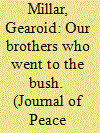

|
|
|
|
|
| Publication |
2012.
|
| Summary/Abstract |
A number of distinct subfields within conflict resolution share foundational theories and emerge from similar understandings of social conflict. One of the most influential of these theories assumes that conflict environments give rise to 'otherizing' dynamics between competing groups. This theory assumes that conflict occurs between and further reifies identity groups. It follows from this theory that conflict resolution practice, and particularly that within the subfield of peacebuilding, must undermine dyadic 'in-group/out-group' conflict through processes of reconciliation and transitional justice. However, the theorized dynamic does not always pertain. In Sierra Leone the truth and reconciliation commission was tasked with fostering reconciliation between the perpetrators and victims of wartime violence. This article describes, however, how former combatants in Sierra Leone are described by many as brothers and friends, as opposed to hated members of a collective 'other'. These findings attest to a distinct lack of 'otherizing' dynamics and demand a reconsideration of peacebuilding practices after what are often considered 'new wars' or 'postmodern conflicts' in sub-Saharan Africa. The article argues that some contemporary conflicts might best be considered post-identity because they are based less on national, racial, religious, or ethnic identity than on circumstance, need, and opportunity. In addition, after post-identity conflicts truth commissions may create new competing identities, such as those between victims and perpetrators. In such cases the applied conflict resolution interventions must emerge from new conflict resolution theory which can adequately understand contemporary conflict dynamics and begin to develop non-identity focused interventions.
|
|
|
|
|
|
|
|
|
|
|
|
|
|
|
|
| 11 |
ID:
123990
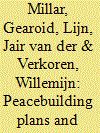

|
|
|
|
|
| Publication |
2013.
|
| Summary/Abstract |
What happens when global meets local? This special issue focuses on the dynamic interaction between externally conceived plans for peacebuilding intervention and local people's own approaches and strategies. The notion of 'friction' provides a perspective that acknowledges the unpredictable and unexpected nature of this interaction. The 'hybrid' outcomes of such dynamic interactions can vary in extent and success, as peacebuilding plans are rerouted and redesigned in practice. This special issue explores how, why, and to what effect internationally designed, funded, or administered peace projects interact with and/or are appropriated by local actors.
|
|
|
|
|
|
|
|
|
|
|
|
|
|
|
|
| 12 |
ID:
183229
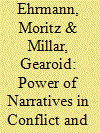

|
|
|
|
|
| Summary/Abstract |
Presenting original data from interviews conducted in Iraq between 2013 and 2019, this paper charts the evolution of conflict related narratives of the ‘other’ among members of the Sunni confession immediately prior to, during, and after the rise and fall of the Islamic State (IS). It charts the evolution of these narratives through three escalatory phases (victimhood narratives, divisive narratives, and violent narratives) and three de-escalatory phases (nuanced narratives, reconciliatory narratives, and unifying narratives). It concludes with reflections on the lessons this case can provide for identifying the best moments for Conflict Resolution actors to intervene in such violent conflicts.
|
|
|
|
|
|
|
|
|
|
|
|
|
|
|
|
| 13 |
ID:
174708
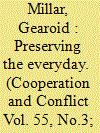

|
|
|
|
|
| Summary/Abstract |
Quite a lot of recent peacebuilding scholarship has deployed the concept of ‘the everyday’. In an extension of the local turn’s emphasis on agency and resistance, much of this scholarship interprets the everyday as inherently a site of politics. It does so either by interpreting every act (no matter how motivated) as an agentic political act, or by equating agentic political acts (at the local level) with the quotidian activities which define the everyday. This article argues, however, that representing the everyday in this way interprets both forms of activity in ways which have critical implications for peacebuilding theory, because both moves inadvertently strip everyday acts of the emergent creativity and innovation inherent to ‘everyday-ness’. Alternative understandings of and engagement with different forms of agency would encourage peace scholars to acknowledge the overtly political nature of peace projects and so to reserve ‘the everyday’ label for pre-political forms of action which may contribute to peace, but in a more unintentional, organic or emergent fashion. This is not to argue that everyday acts are a-political or non-political, but only that they do not have political motivations and are not themselves products of conscious will to power, or even to peace itself.
|
|
|
|
|
|
|
|
|
|
|
|
|
|
|
|
|
|
|
|
|